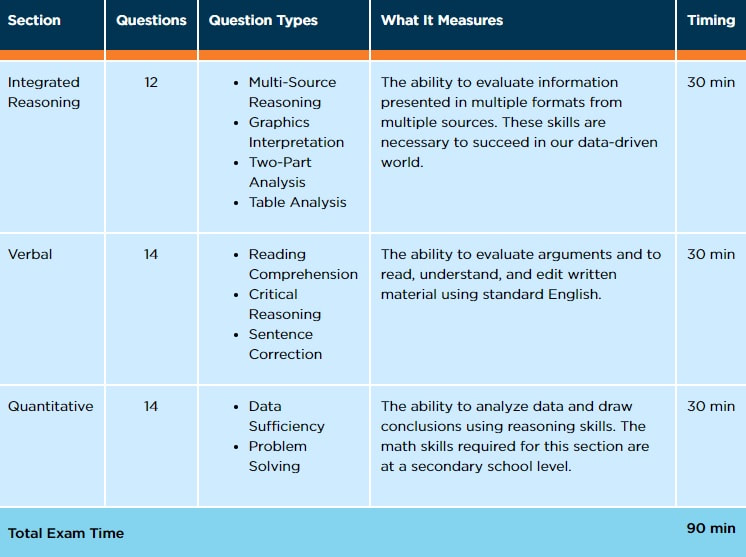We’ve been teaching the Executive Assessment in Dubai since the test was created, so we’ll explain what the Executive Assessment is from 5 perspectives.
An Admissions Test for Executive MBA Programs
The Executive Assessment is to EMBA programs as the GMAT is to MBA programs. Essentially, the Executive Assessment is becoming THE admissions test for Executive MBA programs. It’s widely accepted by top EMBA programs in Dubai and Abu Dhabi, such as London Business School Dubai and INSEAD Abu Dhabi. Moreover, the EA is accepted by more than 50 elite (and not-so-elite) programs around the world. For a full list, check the website of the EA’s creators.
Want to know if your selected program accepts the EA? Ask them! Well ok, first check the admissions page of their website. If it’s not there, email the admissions office telling them you want to take the EA instead of the GMAT.
A Test of Your Ability to Handle Academic Rigors

You’ve got loads of work experience, so why would they give you an admissions test at all? Basically, they want proof that you’ve “still got it.” Getting a 150 on the Executive Assessment suggests to EMBA programs that you will be able to handle the academic nature of the program.
Although the test is aimed at professionals with 10 or more years of experience, it still tests algebra, grammar, arithmetic, and other concepts that you may not have seen in years. Yet, many programs consider mastery of these concepts essential to your academic success.
The most important score you’ll receive on the EA is for the quantitative math section. A solid quant score demonstrates that you can survive Managerial Accounting (for example) without a tutor. If you don’t score well on the quant, they will want you to complete even more tasks to prove you can handle the program.
A Test Made of 3 Sections

The Quantitative Section is basically a math test. You’ll see questions that rely on concepts you would have seen in the 6th grade, as well as questions that require calculations based on algebra and word problems you would have learned up through the 10th grade. Fortunately, there’s no geometry, trigonometry, or calculus on the EA.
Verbal Reasoning tests your reading comprehension by asking you to answer questions related to a long reading passage. There are also sentences requiring you to correct grammar and shorter passages asking you to apply logic.
A Test of Your Resolve

Yes, preparing for the EA is a pain. You’ll have to reactivate concepts from elementary and middle school, and you will struggle and doubt yourself along the way.
And that’s the point!
Many programs require the Executive Assessment of all students because it forces them to endure the same hardship to get into the program.
Moreover, it demonstrates that you can “double up.” Once you’re into the program, you’ll have to work and study, so there’s no better time to show that you can do it than when you’re applying.
What is the Executive Assessment in Dubai? Just a Number

Will your score on the Executive Assessment determine your entire future?
Of course not!
Most programs require a 150 on the test, which is much easier than getting a high score on the GMAT. Once you get a 150, you’re done. They will move on to considering other parts of your application.
Your score on the EA is just to check a box, but it’s an important box…
And preparing properly is a way for you to get it this part of your application done the first time.
Frequently Asked Questions about What is the Executive Assessment in Dubai
What does the Executive Assessment test?
The Executive Assessment tests your quantitative and verbal skills. Check out the chart above for the exact sections and question types. It’s a bit of an Executive MBA readiness test. From our experience, EMBA programs are very concerned that:
- Your scores are balanced. In other words, you don’t have a really great quant score and a low verbal score.
- You have a strong quant score. As you can imagine, many of your EMBA courses will require strong quantitative skills. The EA is one way that EMBA programs can assess your quantitative abilities using a universal metric.
- You go through the pain of preparing for the test. This process gets you ready to study for your EMBA.
How hard is the Executive Assessment?
It depends on the student. The most challenging section for most students is the quantitative reasoning section. It has probably been many years since you studied algebra or probability, so reviewing for the test is essential. A skilled tutor (like us!) can help you through the process of preparing for the Executive Assessment in the least painful manner. It will also save you time in the long run because you won’t have to do extensive research and cobble together your own materials to prepare.
Engineers and finance professionals tend to score well once they have prepared properly. Students in marketing, law, or a more verbally oriented field tend to require more work in the quantitative area but shine in the verbal area. Integrated reasoning tends to be straightforward for almost all students.
What is a good Executive Assessment score?
150. Most Executive MBA programs consider a 150 to be their acceptance cutoff. Unlike the GMAT, higher is rarely better for the EA. Get your 150 and focus on the rest of your application.
Is 147 a good Executive Assessment score?
Yes! A 147 is a good STARTING Executive Assessment score. Unfortunately, it does not make the cut-off for more Executive MBA programs. If your starting score is 147, it should be straightforward for you to score above 150 if you put in the work.
Not Sure If You Need the Executive Assessment? Let’s Talk It Through.
Thinking about applying for an Executive MBA but not sure if the Executive Assessment (EA) is required, or worth preparing for? You’re not alone. Many top EMBA programs now accept or prefer the EA as a quicker, more relevant alternative to the GMAT.
Our expert advisor can help you:
✅ Understand whether the EA is right for your target schools
✅ Decide if a waiver makes sense, or if prep is your best move
✅ Create a smart, efficient study plan if the EA is required
Don’t guess your way through the process.
Book a free consultation today and get clear, honest guidance on whether the EA fits into your game plan.



